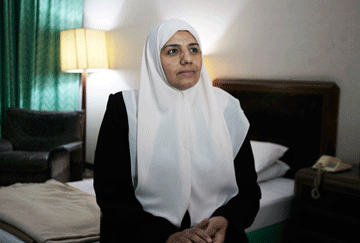
Nawal al-Samarraie, Photo by Karim Kadim
Iraqi Women’s Minister Resigns, Draws Support
by Corey Flintoff, NPR, February 12, 2009
Women in Iraq’s parliament have rallied behind the country’s minister for women’s affairs, who resigned earlier this week saying she was frustrated by a lack of support from the government.
The resignation highlights the plight of many Iraqi women, especially widows created by the country’s decades of war.
Nawal al-Samarraie had served as Iraq’s minister for women’s affairs for less than six months when she created a stir by turning in her resignation. She complained she had never received support from the government of Prime Minister Nouri al-Maliki, and that her budget for projects had been slashed from about $7,500 a month to around $1,500.
“I think it is wrong to stay as a minister without doing anything for my people, especially in this time and in this situation of Iraqi women — we have an army of widows, violated women, detainees, illiteracy and unemployment — many, many problems. I had to resign,” she said.
In Iraq, Widowhood Often Means Poverty
Iraqi women’s advocates have coined the phrase “an army of widows” to refer to the women who lost their breadwinners in the conflicts reaching back to the Iran-Iraq War in the 1980s. Samarraie says there are more than 3 million such women, most of them with children, who have no social safety net.
Samarraie, a 47-year-old gynecologist and member of parliament, says that part of the problem is that Iraq is a patriarchal society, where women are considered adjuncts of their husbands or fathers. And part of it, she says, is political expediency.
“I think they neglect it because they consider that women’s issues [are] secondary,” she says, “compared with what’s going on in the street — violence and unemployed men.”
Traditionally, widows in Iraqi society moved back in with their extended families, but many families already have too many mouths to feed, leaving widows and their children homeless.
An Iraqi widow can claim a small government pension, ranging from about $50 to $75 a month, which many Iraqis say is not enough for a family to subsist.
Critics: Minister Was Poor Choice For Job
Not everyone agrees that Samarraie received no government support in her campaign to help widows. Haider al-Abadi, a leader of Prime Minister Maliki’s Dawa Party, says Samarraie failed because she was an ineffective manager.
“I believe that probably the reason is that she was chosen without adequate research,” he says.
Other male lawmakers say that Samarraie, who is a Sunni from the northern city of Mosul, was set up to fail, for partisan and sectarian reasons. Saleh al-Mutlaq, a secular Sunni lawmaker, blames the main Shiite religious parties, saying no one should expect them to support women’s issues.
“I mean, it was a joke from the beginning, and they will never support it,” Mutlaq says. “And this poor lady, she was a minister for some time, but she didn’t have any kind of financial support to support women’s issues.”
Women In Parliament Promise Support
Samarraie’s resignation stirred a mini-revolt among women in Iraq’s parliament. Alla al-Talabani, a Kurdish lawmaker, says the women’s caucus met for five hours to discuss ways of getting the minister reinstated, with the funding she needs.
“Within the coming month,” Talabani says, “we’ll work on establishing this ministry by setting up an independent council or independent commission for women’s affairs in Iraq, with a good budget.”
Samarraie says she is heartened by the promises of support, not just from fellow lawmakers, but from hundreds of phone calls that have flooded her office. She says she’s wary though, and she wants the promises in writing.
“If they are serious and will work with me,” she says, “I’ll have 50 women working with me. It will be wonderful, if they are. And I’ll make them just write and sign ‘I will work with you without paying, OK?'”
Samarraie is currently at a women’s conference in Istanbul, where she says she’ll take a few days to think about returning to her job.